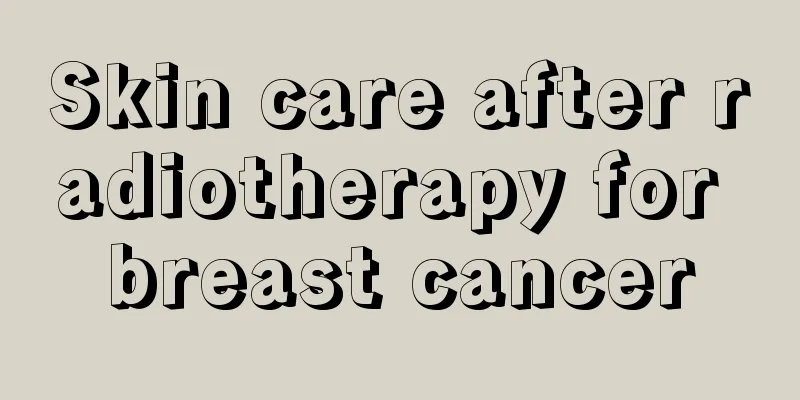Skin care after radiotherapy for breast cancer

|
At present, radiotherapy is one of the most effective means to prevent local recurrence of breast cancer after surgery. During the entire radiotherapy process, skin reactions are the first to be affected. Whether the prevention and treatment of skin radiotherapy reactions are timely and appropriate is related to the completion of radiotherapy and the patient's postoperative recovery and quality of life. Radiation skin reactions are divided into five categories according to standards: Grade 0 is no change; Grade I is follicular dark erythema/hair loss/dry peeling/reduced sweating; Grade II is tender or bright erythema, flaky moist peeling/moderate edema; Grade III is moist peeling and pitting edema that is fused outside skin folds; Grade IV is ulceration, hemorrhage, and necrosis. Ms. Zheng, 57 years old, was found to have a nodule in her left breast during a physical examination. After a biopsy, she was diagnosed with breast cancer and then went to the hospital for radiotherapy for breast cancer. After multiple radiotherapy and chemotherapy, Ms. Zheng found that her armpit skin was damaged, and then the condition worsened, with light yellow viscous secretions, and the damaged area expanded. Ms. Zheng's skin condition belongs to the fourth level, the most serious. Immediately, the medical staff used sterile saline to clean the wound and the surrounding skin, remove necrotic and detached tissue, and after the wound was basically dry, use a sterile cotton swab to evenly and thinly cover the entire wound with a mild ointment; for wounds with more exudate, a sterile cotton swab can be gently wiped off and the medicine is applied repeatedly. In order to avoid continuous exudate, the doctor sprayed a thin layer of ulcer powder on the wound to facilitate the absorption of exudate and form a breathable protective layer; at the same time, the patient was advised to expose the wound after medication, keep it dry, and avoid covering it to avoid secondary damage to the wound. After the careful treatment of medical staff, Ms. Zheng finally recovered completely. After radical mastectomy, the patient's chest wall skin flap becomes thinner. Therefore, the skin of the irradiated area should be kept dry and clean. Do not scrub it with a rough or hard towel, soap or shower gel. Only a soft towel can be used to dry it. It can be cleaned with a warm shower. It is recommended to wear loose and soft cotton cardigan underwear to facilitate chest ventilation. The marking lines on the body should be kept clear. If they are unclear, they should be re-marked by the treating physician. Do not draw or alter them at will. Doctors remind that during radiotherapy, ointments, antibiotic ointments containing metal ions, alcohol and other irritating drugs should not be applied to the irradiated area to avoid aggravating the radiotherapy reaction. Hot compresses, cold compresses or physical therapy should not be performed. If there is erythema or burning sensation, it is generally not necessary to treat it; if it is extremely itchy, you can gently pat the area with your hands, and avoid scratching and rubbing. You can relieve itching by applying non-irritating baby lotion locally. When dry epidermal desquamation occurs, do not tear off the desquamated epidermis, and pay attention to protecting the skin. The desquamation phenomenon will naturally subside over time. Radiation skin reactions in patients undergoing radiotherapy for breast cancer are normal phenomena. As long as you maintain a good attitude and use reasonable medication and care, you can fully achieve recovery. |
<<: The efficacy and role of Chinese herbal medicine cat's claw on breast cancer
>>: Drug treatment for breast cancer
Recommend
Three types of people will be in bad luck once they cheat
In today's society, cheating seems to have be...
Which hospital is good for treating colon cancer
According to current medical technology, colon ca...
Experts explain specific measures to prevent colon cancer
With the change of people's eating habits, co...
What can you eat before drinking to avoid getting drunk? You can eat these things
Although we know that getting drunk is bad for he...
Sequelae of cardiac interventional surgery
In today's life, we often see some people suf...
What to eat if you have severe hair loss
Many people will experience a lot of hair loss be...
What factors can cause bladder cancer
Bladder cancer is not a very common disease in ou...
What should I do if I have a flat nose?
The beauty of the nose is related to the beauty o...
What are the classifications of uterine cancer? How to distinguish early uterine sarcoma from uterine fibroids?
There are many types of uterine cancer, and uteri...
Is it good to have hair growing on moles?
Moles can be congenital or acquired. They are mai...
What tests are needed for lung cancer? Three tests that lung cancer patients must do
I'm afraid that people are most reluctant to ...
How to use ginger to rub your scalp
Ginger is an indispensable ingredient in cooking,...
Survival period of esophageal tracheal fistula
Esophageal tracheal fistula refers to the use of ...
Is pain in the ribs a sign of liver cancer? Don’t necessarily pay attention to these points
Costochondritis, also known as anterior chest wal...
Sequelae of prostate cancer resection
Prostate cancer is very harmful to men's heal...









